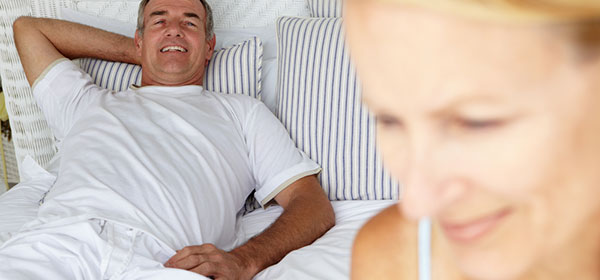Being born before we knew about HIV and other sexually transmitted infections (STIs) such as chlamydia, many older Australians starting new relationships for the first time in many years may not know about safe sex.
Between 2004 and 2010, the rates of chlamydia doubled in Australian women aged between 40–64, with infection rates among women in their early 40s rising 42 per cent between 2009 and 2010.
Many women say they find it awkward to raise the subject with their partner and are nervous about how to negotiate condom usage, particularly as avoiding pregnancy is no longer an issue after menopause.
While the benefits of condoms in preventing STIs are obvious, some older couples face difficulties because of physical changes.
Postmenopausal women may experience dryness and thinning of the vaginal wall, which may cause discomfort when using some types of condoms. But there are a number of lubricants available to help overcome this problem.
If older women are partnering with older men, there may be concerns about using a condom because of erectile dysfunction. The man needs to have a discussion with his doctor about the options available to assist him. Having a sexual health check-up is an important part of this discussion. This can be as simple as a blood test and a urine test.
Jean Hailes’ founding director and gynaecologist Dr Elizabeth Farrell, herself a baby boomer, sees plenty of older women who have contracted an STI.
“Safe sex messages and campaigns seem to have missed the baby boomer generation,” says Dr Farrell. “These women may not be part of what we call the ‘condom generation’, but all women need to understand that if you’re sexually active then you need to plan to have safe sex.
“It’s terrific that women at midlife are wanting to get out and enjoy themselves, but they need to learn to have the confidence to talk to their partner about wearing condoms,” she says.
“I always tell patients that they should practise what they’re going to say to their partner on this sensitive topic, but at the end of the day, they need to feel comfortable to take a stand and say: ‘if it’s not on, then it’s not on!'”
Top tips for safer sex
- while the best way to avoid an STI is to avoid sex, you can improve your safety by always using a condom and having regular STI tests
- you can catch an STI at any age – you’re never too young or too old to practise safer sex
- condoms are not just for stopping pregnancy – they are also the best way to protect against STIs
- STIs don’t discriminate – anyone can be at risk
- STIs may not have any obvious signs
- if you change partners you will need to use condoms to stay safe
- follow the ‘no condom, no sex’ rule if you’re starting a new relationship
- practise what to say to your partner about using a condom and remember it’s okay to tell your partner: ‘no condom, no sex’ or ‘if it’s not on, it’s not on!’
Further information about practising safe sex can be found at www.jeanhailes.org.au.
Published with the permission of Jean Hailes for Women’s Health www.jeanhailes.org.au1800 JEAN HAILES (532 642)
Related articles:
Is your sex life ageing well?
Sex and dating
Should we talk more about sex?

